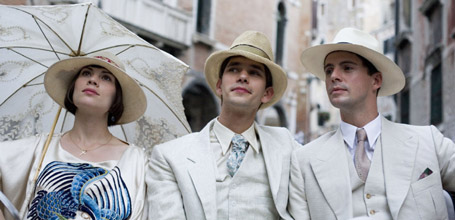Though it may seem like a Merchant Ivory production, with its signature lush visuals and mournful melodrama that accompanies their films, the page-to-screen adaptation of Evelyn Waugh's magnum opus Brideshead Revisited actually doesn't bear their name. Instead, it is helmed by Julian Jarrold, the man behind the charming Kinky Boots and more recently, Becoming Jane.

The visuals are breathtaking, however, and the all too brief appearances of Michael Gambon and the inimitable Emma Thompson are excellent and memorable. It's also interesting to note that despite more than half a century separating the novel and contemporary times, religious fundamentalism is still a resonant theme. Brideshead Revisited won't be everyone's cup of tea, but for fans of British period drama this is probably as good as it gets for 2008.
For those who are not initiated into the world of Brideshead Revisited, the tale is told through the eyes of Charles Ryder (played by pretty boy Matthew Goode), a young man of common birth who meets the flamboyant (and obviously gay) aristocrat Sebastian Flyte (Ben Whishaw) at Oxford. The two quickly become close friends, and eventually Sebastian brings Charles to their family home in Brideshead, where Charles meets the matriarch of the family, Lady Marchmain (Emma Thompson) and Sebastian's sister Julia (Hayley Atwell).
Charles, an atheist, finds out soon enough that Lady Marchmain is a staunch Catholic, and has a vice-like grip over her two children, believing them to always be in need of her supervision. For Sebastian, it's clearly because he is gay, and for Julia, because she cannot live up to Lady Marchmain's ideals of how a Catholic woman should behave. This is exacerbated when it becomes clear, during a trip to Venice to visit their father (Michael Gambon), that Julia and Charles are attracted to each other, and Sebastian feels spurned by Charles and inches ever closer to alcoholism.
A novel as detailed and layered as Brideshead Revisited will definitely lose something in the translation to a movie, and in all honesty a miniseries would probably be the best way to present the source material. However, the film version does remain more or less faithful to the novel, sans much of the nuances. This simplification may have been employed to make the film more accessible to younger, more contemporary audiences who have lesser interest in period soaps, and it works to a certain extent in reducing the tedium these viewers might feel with a movie like this. Unfortunately, the second half of the film, where the focus is on Julia and Charles' forbidden love and Sebastian is largely out of the picture (save for one scene), goes on for a bit too long, and tends to ramble a little.
Although Sebastian's sexuality isn't in question in this film, there is little much else that alludes to the love (one sided or otherwise) between Charles and Sebastian - excepting one quick peck on the lips. It almost seems at times that Julian Jarrold is studiously trying to avoid "contemporarising" Brideshead too much - but a little progress is better than none at all.
Apart from the veritable eye candy that is Matthew Goode (thespian skills be damned), Brideshead Revisited is also chock full of stunning scenery, ranging from Oxford to Venice to Marrakesh, and of course the amazing Castle Howard, which was also used as a location for the miniseries. Is there a reason to revisit Brideshead? Probably not, but one could do worse in this dry pre-Oscar movie season than to take this walk down pre-war England (and memory lane for some) - that is, until the sizzling hot Daniel Craig makes a return as Bond in Quantum of Solace.












 Printable Version
Printable Version









